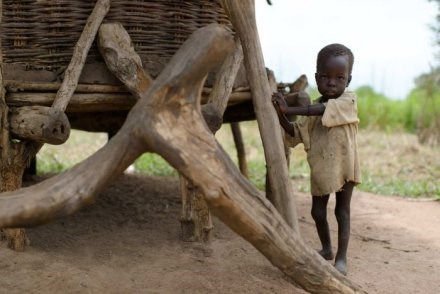Radio Australia
Saturday March 4, 2017

Somalia is expected to be the next nation to declare a state of famine as several other countries across eastern Africa face severe food shortages, an aid agency says.
Somalia is tipped to become the next nation declared to be in a state of famine, as food shortages across eastern Africa reach a crisis point.
More than 5 million Somalians are already on the brink of famine, according to aid agency Plan International, and it expects an official declaration by April.
"It's pretty staggering," Plan Australia's Program Director Dave Husy said.
"We're looking at 40–50 per cent of the population facing acute food shortages, and a good proportion would be reaching a desperate state.
"My expectation is there will be a declaration [of famine] within four to six weeks."
Last week South Sudan declared a famine in areas of the country's south, where civil war has displaced thousands of people, disrupted crop planting and led to economic collapse.
It is the first country in the world to be in famine in six years, since Somalia emerged from famine in 2011. Nearly 5 million people are in urgent need of food.
Now Somalia faces renewed threats to its food supply. Like South Sudan, it is riven by conflict and fighting.
As a so-called failed state it has no centralised or functioning government, meaning there is next to no state support to assist people at risk.
Moreover, a protracted drought has led to water shortages, livestock loss and the failure of food production.
A sizeable proportion of the population faces immediate risk of starvation, Mr Husy said.
"The extended conflict that exists in areas of the country makes any functioning service provision extremely difficult," he said.
"So the emphasis shifts to humanitarian access for external, global agencies such as the United Nations, NGO's and relief agencies.
"So the emphasis becomes, can they get access to at-risk populations in those situations, and negotiate the protagonists in that conflict? It is quite different from a situation where you would have external aid and humanitarian assistance provided where there is a functioning government. It makes it very difficult.
"You have to walk through a political minefield to ensure assistance can be delivered."
Millions in urgent need of food across Africa
Several other countries across eastern Africa face severe food shortages in the weeks and months ahead, if not famine.
More than 20 million people are in urgent need of food in Somalia, South Sudan, Kenya, Nigeria and Ethiopia, according to Plan Australia.
In Yemen, around half a million children suffer from advanced malnutrition, and up to 7 million people need urgent food aid.
Yemen is now classified as the world's worst humanitarian disaster because of its own long-running civil war and the war's impact on food supplies.
"The conflict in Yemen and the steady degradation of both government capacity and community resilience mean it is in a state of near collapse of governance, similar to the situation in South Sudan and Somalia. So you begin to see a real crisis emerging that people have no ability to support," Mr Husy said.
Significant areas of Ethiopia face severe food shortages, and are in need of food aid, but are not in imminent danger of famine.
Kenya and Nigeria also face food shortages, but governments in both have a greater capacity to respond to those in need and can move food and resources more easily.
The Australian Government earlier this week committed an additional $20 million to Somalia and South Sudan for food and life-saving support.The Australian Council for International Development said the funds would help avert an even greater humanitarian crisis. But without an even bigger international response, millions of people across eastern Africa will be at risk of starvation by August.
The United Nations said it urgently needed nearly $6 billion in the next few weeks to avoid what it called a "catastrophe". But so far it has received only half a billion dollars.
The United Nations' definition of famine is when 20 per cent of a population faces extreme food shortages, 30 per cent of people experience acute malnutrition, and at least two people per 10,000 die every day.